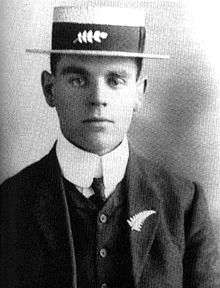Albert Henry Baskerville
Albert (Bert) Henry Baskerville (born as "Baskiville"[2]) (15 January 1883 – 20 May 1908) was a Wellington postal clerk, a rugby union forward, author of the book "Modern Rugby Football: New Zealand Methods; Points for the Beginner, the Player, the Spectator" and a pioneer of rugby league.
 | ||||||||||||||||||||||
Personal information | ||||||||||||||||||||||
|---|---|---|---|---|---|---|---|---|---|---|---|---|---|---|---|---|---|---|---|---|---|---|
| Full name | Albert Henry Baskiville | |||||||||||||||||||||
| Born | 15 January 1883 to Henry William Baskiville & Maria Mace, at Waiorongomai, Te Aroha, New Zealand | |||||||||||||||||||||
| Died | 20 May 1908 (aged 25) Brisbane, Queensland, Australia | |||||||||||||||||||||
Playing information | ||||||||||||||||||||||
| Position | Wing | |||||||||||||||||||||
| ||||||||||||||||||||||
Source: [1] | ||||||||||||||||||||||
Rugby football
Prior to becoming the administrator of the 1908 tour Baskerville played rugby for the Oriental club in Wellington and was said to be on the verge of provincial selection.[3] His father had been killed in 1903 and Bert had been the main income earner for the family since then.[3] His book, Modern Rugby Football: New Zealand Methods; Points for the Beginner, the Player, the Spectator, was published in 1907 and gave him somewhat of a national profile. After the success of this project he moved on to his next ambitious idea, a professional rugby tour of Great Britain.[4]
The Tour
Baskerville wrote to the Northern Union and asked if they would host a touring party of New Zealand rugby players. The Northern Union were excited by this proposal and quickly agreed. After this Baskerville began to work on organising the tour full-time, leaving his job at the Postal Department and severing his connection with the Oriental Football Club. The Wellington Rugby Union moved quickly to attempt to stop him from attending their grounds and he received a life ban from the New Zealand Rugby Union. Despite this he managed to put together an impressive touring party that included eight All Blacks, including four from the 1905 tour of Great Britain. The team was dubbed the All Golds by the Sydney press, a derogatory play on the New Zealand rugby union team's nickname the All Blacks.
The tour was a great success both financially, each player earned roughly £300, and on the field, where the touring side won consecutive Test series against Great Britain and Australia. For most of the tour Baskerville was busy with the administration work and it was not until the final game of the British leg, against St Helens R.F.C., that Baskerville played, scoring a try. On arriving in Australia he then played in the first ever trans-Tasman test which was the debut match of the Australia national rugby league team, again scoring a try. That was to be the only time that Baskerville would represent New Zealand in a Test match. Baskerville contracted pneumonia on the ship taking the touring party from Sydney to Brisbane and, after several days in hospital, died aged 25 in Brisbane, Australia on 20 May 1908.[5] His body was taken by manager Harry Palmer and a group of players from each province back to Wellington. The rest of the touring party stayed in Australia to complete their remaining fixtures. Like five other members of the touring party Baskerville is buried at Karori Cemetery.[6]
Legacy
It was he who practically originated the professional Rugby movement in Australasia
On their return from Australia the remaining members of the tour party held a memorial game, the first game of rugby league in New Zealand, and raised £300 for his widowed mother.[3]
The Courtney Goodwill Trophy, international rugby league's first, was presented for the first time in 1936 and depicted Baskiville, along with other pioneering greats of the code, Jean Galia (France), James Lomas (England) and Dally Messenger (Australia).[8]
He is commemorated by the naming of the Baskerville Shield, the trophy awarded when Great Britain and New Zealand meet in test series. In 2001 Baskerville was inducted as one of the NZRL Legends of League.[9]
See also
- 2007 "All Golds" Tour – celebrating the centenary of Baskerville's 1907 Tour.
- History of Rugby League
References
- "Statistics at rugbyleagueproject.org". rugbyleagueproject.org. 31 December 2017. Retrieved 1 January 2018.
- Sean Fagan. "Albert Baskerville – Or Baskiville?". rl1908.com/index.htm RL1908. Archived from the original on 17 May 2008. Retrieved 28 June 2008.
- John Haynes From All Blacks to All Golds: Rugby League's Pioneers, Christchurch, Ryan and Haynes, 1996. ISBN 0-473-03864-1
- "The All Golds". Archived from the original on 10 October 2017. Retrieved 4 September 2018.
- [Sean Fagan Sean Fagan]. "2008 RUGBY LEAGUE CENTENARY NEWS & UPDATES". rl1908.com/index.htm. Archived from the original on 6 May 2008. Retrieved 28 June 2008.
- Relatives and Teams to remember Original All Golds Archived 12 October 2007 at the Wayback Machine NZRL Press Release, 10 October 2007
- "A. H. Baskerville". The Sydney Mail. Australia. 27 May 1908. p. 1414. Archived from the original on 24 January 2013. Retrieved 20 November 2009.
- “League Legends: fast facts about rugby league” at nsm.org.au
- "New Zealand Rugby League Annual Report 2008" (PDF). NZRL. 2008. Archived from the original (pdf) on 12 September 2009. Retrieved 21 July 2009.